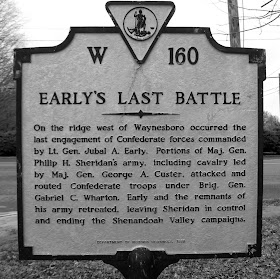When the 1860 census was taken Elizabeth, Willie Ann, and several children from Powhatan's first marriage were still living on the farm. Elizabeth's real estate was valued at $400 and her personal property at $1,000. William Henry's real estate was valued at $5,000 and his personal property at $5,000.
Three years later, he enlisted in Confederate States Army as a private in Company G, 51st Virginia Infantry Regiment. The regiment was known as the Virginia Volunteers and had been originally mustered at Wytheville, Virginia, two months after the first Battle of Bull Run. During the winter of 1862-1863 the regiment established their winter camp at the Narrows of the New River, which was five miles from Pearisburg, at a point where the river was shallow and narrow. William Henry Jennings likely joined the regiment at their winter camp soon after enlisting.
 |
| Topographical map illustrating the Narrows at New River; courtesy of Wikipedia |
At the start of the 1863 campaign season the 51st Regiment was assigned to Wharton's Brigade. Their mission was to protect the Kanawha salt works, lead mines at Wytheville, and the Virginia & Tennessee Railroad in southwestern Virginia from Federal cavalry troops. They spent the summer marching here and there to protect their objectives. During September fatigue was the regiment's main problem. They had marched nearly constantly for four months yet had not engaged the enemy in a major battle. William Henry Jennings was promoted to Corporal on 1 September 1863.
 |
| From Harper's Weekly, 14 Jan 1865; illustration courtesy of Son of the South |
He fought with the regiment throughout 1864 but the Confederacy began to taste defeat at the hands of Union General Sheridan late in the year. Morale across the South was near its nadir. Grant pressed hard on Lee's troops around Richmond; Sherman was ravaging Georgia; and Sheridan had lain waste to Virginia's beloved Shenandoah Valley.
That winter, the 51st made its winter quarters in Fishersville, and the time passed without incident. In late February the regiment received orders to prepare for a move. At dawn on March 2, the 51st Regiment began moving towards Waynesboro. The Federal cavalry approached the unit as it prepared to cross the Shenandoah River. Wharton's men quickly formed into a battle line, having only 1,000 muskets and four artillery pieces. They were outmanned. The enemy cavalry hit their left flank hard and the Confederal line disintegrated. William Henry Jennings was taken prisoner by Union soldiers. He was one of 393 Confederate prisoners captured that day.
 |
| Virginia Historical Marker; courtesy of Visit Waynesboro |
The prisoners were marched to Staunton, Virginia, in muddy ground so terrible it was described as being "up to our knees and some places even deeper." They were housed in Staunton temporarily at the Western State Hospital and were fed flour and bacon. Soon they were on their way to Harper's Ferry where the prisoners were shipped either to Elmira, New York, or Delaware.
William Henry Jennings was sent to Fort Delaware, Delaware, on 12 March 1865 and remained there for the rest of the war. On 10 June he was administered the Oath of Allegiance and released. Several versions of the Oath were in use, but this is the one of the most common:
 |
| Civil War era photograph of Fort Delaware prisoner of war camp; photograph courtesy of the Library of Congress |
"I do solemnly swear that I will support, protect and defend the Constitution and Government of the United States against all enemies, whether domestic or foreign, and that I will bear true faith, allegiance and loyalty to the same, any ordinance, resolution or law of any State, convention or legislature to the contrary not withstanding; and further, that I do this with a full determination, pledge and purpose, without any mental reservation or evasion whatsoever: So help me God."
William Henry went on to marry three times (his first two wives were sisters) and fathered six known children. He died in 1929 at the age of 91 years old and is buried in Tudor Hall Cemetery in Amherst County, Virginia.
No comments:
Post a Comment